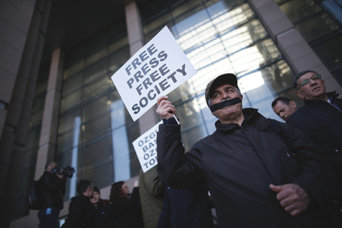- About
- Topics
- Picks
- Audio
- Story
- In-Depth
- Opinion
- News
- Donate
- Signup for our newsletterOur Editors' Best Picks.Send
Read, Debate: Engage.
The Universal Declaration of Human Rights reached its 70th anniversary on Monday, having been signed by the majority of nations at the UN assembly on 10th December 1948. In 30 short statements, the document highlights the fundamental rights of every human being, the right to their own dignity and liberty, the right not to be tortured or put into slavery; the right to think and believe as you like.
Looking at this fundamental document, we can already detect some issues. Namely, does its Western framing, origin, argumentation and imposition pose problems for the world? The nations that abstained certainly thought so, and formed a significant counter-axis to the document, including the Soviet Union and Saudi Arabia.
Is the document simply a way to leverage power over less powerful nations? It may be. There are certainly complex problems associated with the declaration, but we have to ask, very generally, 70 years on, is it still relevant? Or, more deeply, what even is a human right?
Human Rights are strange things. They're attacked on all sides, it feels like. Not only by dictators but actually, very clearly by the supposed upholders of democratic freedom. In the U.K., Human Rights are routinely denounced by politicians and the media for circumventing the immediate urge to punishment. Terrorists are the example always used: terrorists are bad players and should be punished immediately and severely, and yet, the politicians and media cannot do this since the human rights of the terrorist would be under threat. One of the key reasons the British population voted to leave the European Union was to get out from under the jurisdiction of the European Courts, including the Court of Human Rights.
Although it is an egregious example of who human rights serve and protect, it is true that terrorists have their human rights too, which deserve to be defended. If we believe in our ideals of justice and democracy and freedom, every person should be allowed a fair trial so they can experience justice. Shooting people, even someone like Osama bin Laden, is not exactly living up to these ideals.
OK, so human rights are unpopular, but are they still relevant?
Amnesty International is currently looking at ways in which these rights are part of the real world and not part of some abstract debate. They're asking activists and communities around the world to tell them what human rights mean for them.
Nurcan Baysal, Turkey
Nurcan Baysal is a Kurdish human rights defender and journalist from Diyarbakir, in the Kurdish region of Turkey. Nurcan has faced death threats, received abusive messages and she’s been detained by the authorities. In spite of everything, Nurcan is determined to keep fighting.
"Human rights are something so basic, but so important. Without rights we are nothing. If you can’t speak, if you can’t see, or say what you’re thinking; if you can’t go and protest, use your own language or come together with your own friends to speak out, what’s the point? Life is meaningful with our rights!
I have been protecting the rights of both women and children for over 20 years. I am a journalist first and foremost, but I’m a human rights defender too.
There’s been war in our region for over 40 years. I am part of the second or third generation of Kurdish people who grew up with war. I don’t want my children to have the same life. That’s why I am calling for peace and working to ensure the rights of the community are protected. It hasn’t been an easy task. I’ve faced a lot of challenges, mainly from the Turkish state. My existence is a problem for those in power.
When the curfews were imposed, the Turkish media totally closed their eyes to what was going on in our region. I was one of the few people who informed the Turkish public what was really happening. I really tried to make a difference – and looking back, I feel like we saved some people."
There are many other examples you can see on the Amnesty website: but that's just one way you can think about human rights - not doing some crazy terrorist-protection thing, but rather helping someone who is at extreme risk.
Human rights don't seem to come from anywhere intrinsic in human beings (unless we have a good argumentation for human nature, which we may be able to establish). Rather, they come from history; the way history has played out. Oppression, violence, suppression, genocide, war – these things have led to us thinking and talking about rights. Let's try to remember that when we talk about rights, we're talking at the same time about the best and worst aspects of human beings.
Photo Credit: CPJ (Committee to protect Journalists)
